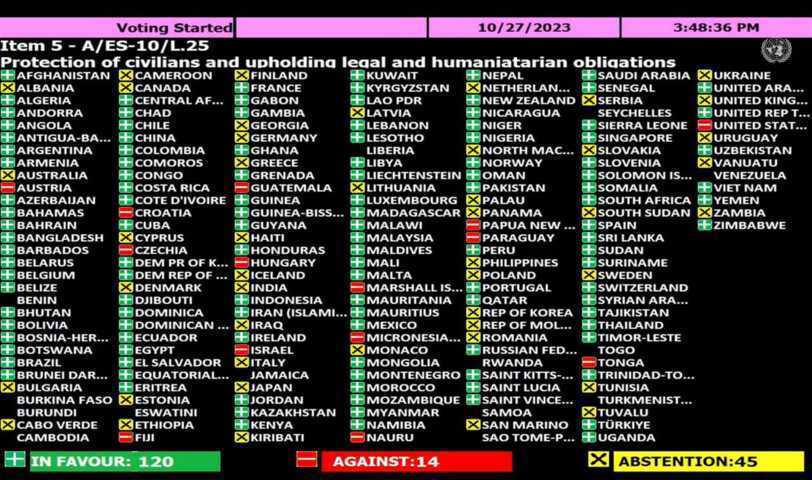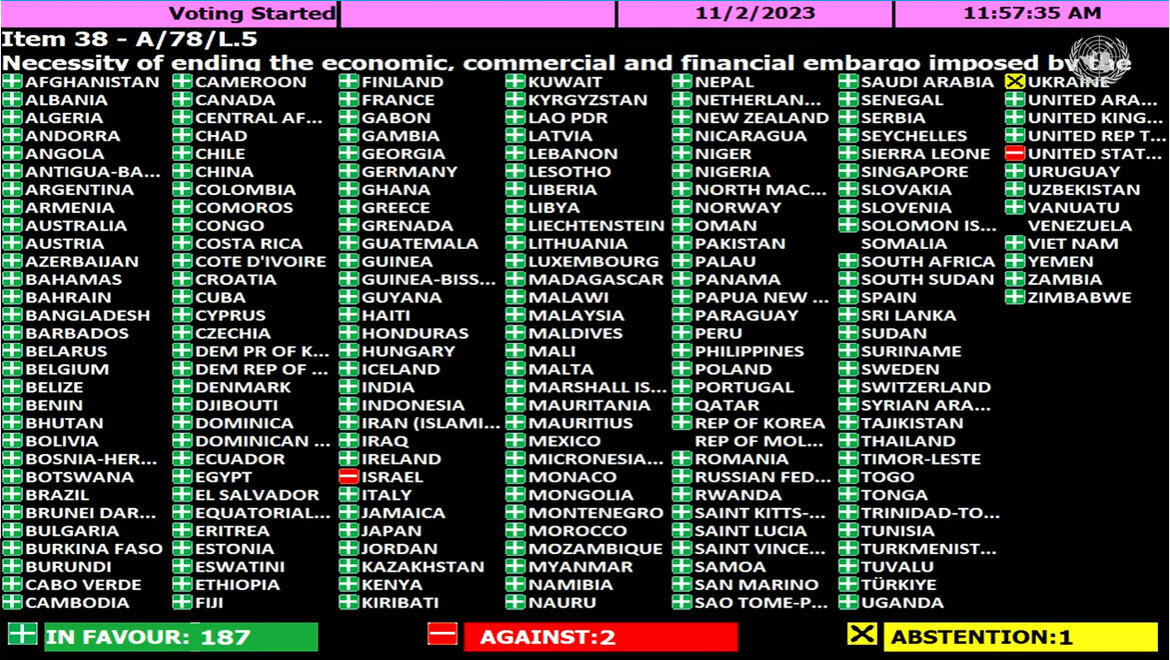Translated by Irene Cecchi
In the last few days, two UN General Assembly’s resolutions have been in the spotlight of the media. The first one is the Resolution A/ES-10/l.25 “Protection of civilians and upholding legal and humanitarian obligations” – that calls for a ceasefire between Hamas and Israel – and the majority of the newspapers illustrated it to the public opinion as a list of countries that endorse, condemn or remain indifferent to the inordinate violence that has been all over the news for the last month and that the European Union still fails to address unitedly. A few days later, the vote to the Resolution A/78/L.5 “Necessity of ending the economic, commercial and financial embargo imposed by the United States of America against Cuba” arouses curiosity since the negative vote of the United States and Israel and the Ukrainian abstention evoke correlations that are anything but a coincidence. However, we shouldn’t omit the fact that this situation is strictly related to the long-lasting diplomatic relations between these countries and not only to the current events.
Different stances and different votes among European countries.
On October 27th, the member states of the European Union took a common stance at the European Council condemning Hamas and supporting Israel’s right of self-defense, along with the agreement over the importance of a ceasefire in order to allow humanitarian aid in Gaza. However, we should remember that UN Resolutions – where each state’s representative has one vote – are not binding, that’s why European countries didn’t bother to present a united front in New York. France, Spain, Belgium and Ireland’s delegations were the ones voting in favour while the abstensions came from Italy, the Netherlands, Germany, Sweden, Poland, Romania, Greece and Slovakia. On the other hand, the countries that voted against have been Austria, Croatia, Hungary and Czech Republic – the latter, historically tied to Israel for the significant Jewish community, considered unacceptable the lack of a clear condemnation of Hamas. Practically, it is difficult to take a common stand about the Middle East issue, considering that only Sweden, Poland, Hungary, Czech Republic, Slovakia, Romania, Bulgaria, Malta and Cyprus among the EU member states recognise the Palestinian National Authority with Bruxelles missing.
The embargo against Cuba at the General Assembly: a plot that has been going on for decades.
The vote in favour of the ending of the US embargo against Cuba – in force since 1962 – has been almost unanimous, with the only negative votes of Israel and the USA and the abstention of Ukraine. Similar resolutions have already been voted in the past – this one would be the thirtieth – with a majority that has increased from 59 positive votes in 1992 to the 2010 results when, for the first time ever, the US and Israel were left alone. When Washington resumed diplomatic relations with Cuba, Obama promised putting an end to the embargo but with the election of Trump in 2016 the US took a step back to their previous position.
On what depends the Israel’s position?
On one hand, the alliance with the United States, imprescriptible for Tel Aviv, is definitely a factor not only because of the conflict that has been going on for over 70 years, but also by virtue of the isolation in the Middle East: in fact, among the bordering countries neither Palestina nor Lebanon and Syria recognise Israel and the normalization agreements with Saudi Arabia were about to be signed right before the outbreak of the conflict on October 7th. The main reason behind Israel’s position is strictly related to Cuba: in 1973, Castro sent to the Sinai and Golan region four thousand soldiers in order to support the Syrian-Egyptian troops fighting the Yom Kippur war, causing the ongoing interruption of bilateral relations with Israel.
What about Ukraine?
Also Ukraine needs the US' support against Russia – now more than ever – but during the 2021 vote, before the invasion, already decided to abstain. Even after the collapse of the Soviet Union, La Havana maintained firm relations with Moscow: Russia is one of the few countries that doesn’t require a visa for the island’s citizens and this year they signed an agreement to increase investments in Cuba.
Mondo Internazionale APS - Riproduzione Riservata ® 2023
Share the post
L'Autore
Michele Bodei
Categories
Tag
Assemblea Generale Israele Palestina Cuba



